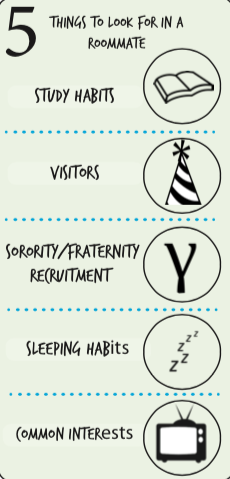Students who wish to have a voice in choosing their roommate may use Roomsurf. When students join the site, they are
prompted to take a short survey about their living habits and then fill out boxes such as “About Me,” “Interested In” and “Message Me If.” Roomsurf then compiles top matches based on the user’s survey responses, simplifying the process of
finding a roommate.
Facebook makes it easy to find roommates, as well. Most colleges create an official “Class of ____” page, which all incoming freshmen are invited to join. People talk about various subjects in these groups, ranging from their own roommate preferences to their favorite movies and foods.
Facebook groups also help college students find people who will be participating in the same activities and organizations as them.
The blind date
Some college officials say that choosing roommates for students helps ensure they are exposed to different points of view. They worry that incoming freshmen will tend to pick people of the same ethnicity, social background or hometown, inhibiting them from their ideal college experience.
Earlier this year, MVHS class of 2014 alumnus Ashish Samaddar, a freshman at UC Berkeley, filled out a short questionnaire that his college provided: Do you maintain normal sleeping hours? How social are you? Sleep style? Do you keep your room clean or messy?

As more freshmen go online and use social media sites in an endeavor to shape their living situation, college officials are split on whether or not this is a good idea.
An editorial written by the Washington Post says, “Giving freshmen more say in their living arrangements can result in fewer roommate conflicts, some college housing officials say.” Living with a stranger is always a risk, but allowing students to pick that stranger builds an investment in wanting to make things work.
Samaddar said that initially he worried that the wrong roommate could ruin everything. After enduring several summer camps with unfortunate roommate experiences, Samaddar realized that he would never want to randomize his college roommate selection process.
“I understand the appeal of randomized roommate pairings, as you get to meet a really different person, or have an experience different from what they already have,” said Samaddar.
However, Samaddar has not been satisfied with his roommate, citing personality clashes and different extracurricular interests as reasons for most conflicts. Although, Samaddar has not had the best experience with his “blind date” and the option is risky, there still remains the possibility that others that take this chance may find their ideal roommate.
The random roommate
Senior Kaholi Kiyonami is excited by the prospect of having a random roommate chosen by the college she will be attending.
Living with a roommate that you know beforehand may prevent you from putting yourself out there and trying new things, which is one of the main reasons that Kiyonami prefers the idea of being paired with a stranger.
“If we’re from similar backgrounds, it might prevent me from exploring other cultures and putting myself more out there,” Kiyonami said. There are most definitely different ways that you can look at finding a roommate. If you have the same interests as your roommate, you may also share the same classes and therefore will be able to work together. However, if you have different interests and passions, you will not be stuck talking about the same subjects and would gain a different perspectives.

Kiyonami’s ideal roommate would be more outgoing than she is and would push her to step out her comfort zone. Being assigned a roommate in her mind his appealing because it would force her to meet new people and expand her network.
“Our questionnaire only has four questions, andI don’t think that’s enough. I don’t really care about if they are from a different country,” Kiyonami said. But I’m more concerned about lifestyle, like what if we don’t wake up at the same time andI am up at 3 a.m. and they get really pissed?”
Kiyonami agrees that a difficult roommate could potentially ruin her college experience as the pressure that comes from her classes combined with the stress that comes from dealing with a troublesome roommate would be overwhelming. However, she remains optimistic that rooming with a person that she has never met before will allow her to explore new cultures and gain new insights.
“You’re meeting a completely new person [and that is] like a new friend. Whereas, if I [were] going with someone from my high school, I’d be obligated to room with them,” Kiyonami said. “It pushes you to step out of your comfort zone and get more involved.”




